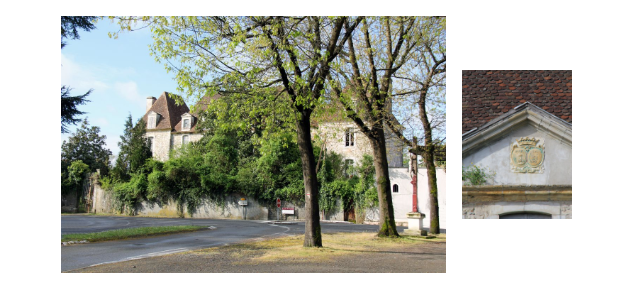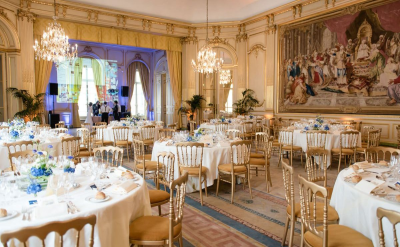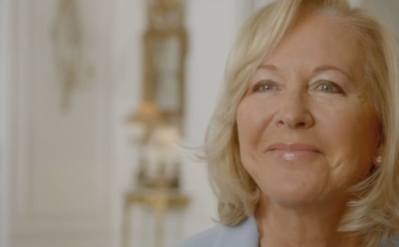News

École des Roches in Maslacq
13 November 2024
Older / Former
Viewed 507 times

Château de Maslacq and its coat of arms
Former Ecole des Roches (1940 - 1951)
Former Ecole des Roches (1940 - 1951)
The teaching method used at the Ecole des Roches was based on the "letters to the captains" that Director André CHARLIER used to address to students selected for their seriousness, thus delegating some of the discipline to help them acquire a sense of responsibility.

Some of André Charlier's letters to the Captains of the École des Roches
The captaincy & the vocation of Jean-Marie GracH
Maslacq, September 27, 1942
True action is exercised by what you are...
The start of the new school year is approaching, and it won't be any less difficult than last year, because you'll have a lot of new comrades. The way we're set up now, we're all in one house too many, whereas we should be in two. However, we need to get off to a good start, otherwise the whole year will be compromised. So I want to give you my instructions in writing, so that there can be no uncertainty. First of all, I'd like to warn you about the dangers of your job. In the first place, there are the dangers of the small privileges you are granted, which you readily interpret as a greater freedom to which you believe you are entitled. Nothing could be further from the truth. Your job is a service.
You must be more demanding of yourselves than of others.
You'll never succeed in creating real discipline if you allow yourself what you deny others. Today's young people have never been accustomed to self-restraint, and unconsciously seek above all to do as they please. If we fail to correct this tendency at Les Roches, we' ll fail in our mission and be lost. I want captains who are the most exact, the most hard-working, the most disciplined, the most concerned with order in every respect. I warn you that I will often have to refuse what you ask of me. You will accept it if you consider that I must always have in mind the general interest of the community, which often escapes you. I don't want recriminations, but cheerful obedience.
Think of something other than yourself. Remember the admirable page on discipline that Captain de Bary extracted for you from the army regulations and read to you in June. I'll read it to you again.
The other danger, which is the main one, is that you often claim to be "training your youngest comrades". You see what this implies: you believe that your own character is perfectly formed and that you are capable of directing yourselves. Be modest. Be humble. Mature men, leaders themselves, are not so pretentious. We'd first have to agree on what "training" means, and that's not what we're talking about here. What I'm asking you to do, above all, is to be rigorously strict about everything that concerns the material order of the house. This will go a long way towards creating the spiritual atmosphere I desire, which could never even begin to take shape in a messy, carefree environment. We need to create living conditions in which the soul can flourish. Order is one of these essential conditions, and you are the workers. Secondly, you will always be ready to help your comrades in their difficulties and sorrows, great or small. That goes without saying. Kindness must be one of your preferred qualities. But I don't want any special friendships, any guidance of conscience. Don't take the place of the chaplains. I have to tell you that last year there was far too much chatter and gossip. So much talk is detrimental to deep action. Be constantly aware of the trap you're walking into: you think it's essential to spend all your free time with one of your comrades because you believe it's your mission to "train" him or her. What an illusion! You're looking for yourselves.
True action is exercised by what you are. So try to be, that's how you'll impose yourself. If you're living examples, two words will suffice to straighten out what's wrong around you. But above all, don't try to be clever, i.e. to appear to be something you're not: you'll immediately be discredited.
I therefore insist on this point, which seems to me to be the most important aspect of your role.
You must essentially be the creators of a certain order. This order is necessary for a soul to live in the house. Everything you do, down to the smallest detail, will be a gain for the creation of this order. Don't think they're beneath you - everything is important. Take care of everything: the cleanliness of the house, the strict precision of the boys in all the acts of their lives, their dress, their language. It's up to you to make sure that everything is clean in gesture and word. It's up to you to make sure that everything is straightforward in gesture and speech. I want boys who stand up straight, who look straight ahead, and who speak firmly.
I told you: be humble. I repeat: don't rely too much on yourselves. Look for strength where you can find it: only the spiritual life can give it to you. And it will also give you the radiance that enlightens your souls and makes them wish to surpass themselves.
I told you: be humble. I repeat: don't rely too much on yourselves. Look for strength where you can find it: only the spiritual life can give it to you. And it will also give you the radiance that enlightens your souls and makes them wish to surpass themselves.
February 3rd 1943
In the letter I wrote to you at the start of the school year in October, I told you, among other things, that the house could not have a soul unless we first ensured material order, and that you were the workers of that order. I added that true action is exercised by what we are , and I gave you this rule: "Try to be. Let's see where we are today.
During my long absence, you've made some definite efforts, and I have no doubt you've shown good will, but it's all still far too hesitant and fragmentary. There have been unfortunate lapses which have not helped to increase your authority, as I'm sure you're aware. Your teachers are worried about your inability to work on your own, and your personal efforts are truly derisory. At home, outside the classroom, the study or the dormitory, as I told you the other day, I see you disappearing and isolating yourself in corners, you don't think of giving something of yourself to little or medium-sized children. That's not the way to create the spirit of a house. You lack guts, you lack generosity. You don't give the impression of true joy, you lead a mediocre life. But I've often told you that your first duty is to set an example: don't think of this as a boring, banal moral rule. It's a precept of exaltation and enthusiasm. Let's talk a little less, if you like, about rules to be observed, but let's talk more about self-giving and generosity. It's through the gift of yourself that you'll impose yourself and win over the souls of the boys in the house. My civilization (that of France)," says Saint-Exupéry in a fine book I'll be reading to you, "has made each man responsible for all men, and all men responsible for each other. Isn't the feeling of this responsibility enough to give you the zeal you lack? Through your comrades, feel yourselves responsible for defeated France. And if you tell me that the feeling of defeat is not likely to arouse enthusiasm, I'll quote Saint-Exupéry's words: "Defeat may prove to be the only path to resurrection, despite its ugliness.
And if you really want to bring this house to life, to give it a soul, and not just enforce the order that doesn't yet exist, you need to form a team. Keep petty rivalries, antipathies and susceptibilities to a minimum. It's essential that you work as one, that you tackle the common task together, and that you don't work in isolation: that's the essential goal I've set you for this term. Each of you must strive to be in the highest sense of the word, but also know how to blend into the team, working for and with others.
February 18, 1943
The captain has a soul...
There's one point I want to draw your attention to today: you're in charge of souls. This is the meaning of your responsibility.
The first thing you have to do, and you don't give this nearly enough thought, is to pay attention to the souls entrusted to you, whoever they may be, and perhaps then you'll get to know them. Have you ever noticed how difficult it is to get to know someone? Your experience will teach you that you can live for a long time next to another soul without even suspecting what's going on inside them. But do you really know the boys in your dorm? Do you even want to get to know them? Question yourself carefully on this point: it's crucial.
Everything you do depends on it. It's not a question of taking an interest in those who are sympathetic to you, and dropping the others: anyone is capable of doing the same. You're also responsible for those you don't like, and if you show the slightest hint of antipathy, you'll lose all your ability to work with them. You may be feared, but you won't be loved. Being loved is quite different from being popular. Popularity is hateful. True popularity demands that you be both loved and respected. What's the point of you suddenly being very demanding on a point of discipline? People will want to know if you're just as demanding of yourselves, and they'll only respect you if they do. You'll only be loved if you can show others true camaraderie, friendship being a more delicate feeling that can't be controlled. I've already told you that you mustn't pretend to "train" or "reform" others, because the development of a soul is something very mysterious, where God's grace is fortunately much more effective than our own action, but you can and must help your comrades either by advice, or simply by a mark of sympathy; It's not manly to be sentimental, but it's not unmanly to show others thoughtful attention. That's what true authority is based on, and you'll see that you'll be listened to with little need for sanctions. In a word, the first condition of authority is respect for the soul. I would like you to learn this respect, for it is still foreign to you. It will teach you not only to lean towards others - and they may expect something from you that only you can give them - but also to remain worthy of yourselves.
March 11, 1943
Necessity of the inner life
In the Captain's Charter it is written: "His task makes him realize his weaknesses and shows him that to serve and be useful, he must first know himself in all humility, improve himself willingly, accept authorized advice, and trust in God's goodness". This tells you how much importance you should attach to your spiritual life. The natural qualities of a leader are undoubtedly vital: energy, authority, dynamism, etc., but ultimately they are insufficient if they are not complemented by a certain fervor of the inner life. And inner life is your soul's intimate relationship with God.
But as I watch you live and observe you, often without you realizing it, I find that you have little capacity to enter into yourself. When you think about yourself, you're mainly concerned with the impression you can make on others. It's a natural failing at your age.
A Lyautey in Saint-Cyr once wrote in his diary: "Eight days without prayers, I've chatted more than ever. I show myself as I would not like to be believed, my tongue speaks for itself... In truth, I must reduce all manifestations of my being to selfishness and self-love." Who among you could not write the same thing? And he would add this, which I believe would also be true of each and every one of you: "I suffer from having a soul high enough to understand what I should be, and from not having a character firm and tempered enough to realize the conception I have had of the life I should lead."
Everything distracts you from paying attention to what's going on inside you. There's your work, which demands most of your activity; there's home life, which creates obligations; there's the gravity of the circumstances we're going through, which obsesses your mind. So there's little room for silence and contemplation in your life. Some of you may come to talk to me about problems that deeply concern your soul and your destiny, but this concern is often of no consequence, and the conversation has no follow-up. I know how to tell the difference; it's not always your fault.
So your inner life is reduced to a few fleeting flashes. But it's of vital importance to you that you don't stop there. It's important to you, because you're at an age when you need to get to know and own yourself, and it's important to all your fellow students who watch you live, in short, to our whole community.
You are creatures of God, who in creating each of you had a particular thought: it's time you got to know this divine thought about you, otherwise life will soon take hold of you and prevent you from grasping anything of this unique relationship you have with the Eternal.
Everything could become so clear to you right now, if you wanted it to, and your life would be forever transformed. All you have to do is set aside a few moments each day for silence (do you respect it, and do you respect daily meditation?), and I'm not just talking about material silence. You must also silence the tumult of thoughts, and let all the agitation of the day die in the depths of this meditation. There, hold your soul for a moment under the gaze of God, and in a very simple gesture, make an offering of yourselves to this God who expects something specific from you. If you remain faithful to this habit, you who are so tormented because you don't yet know who you are, you'll soon see the light shining in you, and many doubts and objections will fall from you without you even having bothered to fight them. Then you'll feel how much the soul enlightened by God dominates everything that happens in the intelligence alone. Then something will radiate from you. Others won't know what it is, but they'll be struck by it; they'll feel you illuminated by an inner light, and animated by a secret mastery that far exceeds that which you owe to your own energy alone. Then you can become men of action, for there is no true action except that which is rooted in an authentic spiritual life.
January 19 1944
Be animators...
This is the second term, and you may have noticed, as I did, that on returning from vacation the house was struggling to regain the momentum of the first term. For many, the vacations marked a pause or even a setback, that's a fact. On top of that, the flu has thrown the house into disarray. So there's no time to lose; from next week onwards, we'll need to get going again with renewed energy, and I'm counting on you to give your comrades the zeal they're lacking.
At the start of this new year, I would like to extend my best wishes to the captains' corps. But how can I be more specific about my wishes for you? First and foremost, I want you to understand the seriousness of the times we live in, and therefore the seriousness of the role you must play. I've already told you that we are entering heroic times, and that's no empty word. Any day now, we could be plunged back into war, and if you consider that our country no longer has an army, that everything is in the process of disintegrating, you may well have an inkling of the evils we are threatened with. In these difficult times, I believe that the School, to be faithful to its mission, should be like an Order of Knighthood, with all that this implies in terms of generosity, self-sacrifice and a sense of honor. Please take what I say at face value.
One day, you'll understand better that the great drama we're all involved in is a spiritual drama, in which France, humiliated as she is, is the only country still capable of shedding its blood to defend a certain world order, the one that Christ instituted. And when all is said and done, behind all the clashing interests, it's all a question of whether that order can survive.
You must therefore prepare yourselves for heroic tasks, and that's why I want to see you already as Knights, able to renounce yourselves, able to devote yourselves body and soul. So far, you've made efforts that I appreciate, for discipline, energy, team spirit. Now I want much more than that. I want you to breathe into this still amorphous mass of the School a great breath of ardor and enthusiasm. Rip me from my slumber and fear, lift up these desireless, joyless souls. It's up to you. You've already tried to breathe some life into your respective dormitories. That's good, but it's not enough. I want each dormitory to become a real team, animated by the same spirit. Be leaders, be leaders already. And the first condition is to banish all human respect. As you can see, I'm not afraid of being ridiculed, and I'm not ashamed to use big words that we no longer dare to utter today. Brave the ridicule, brave the skepticism.
Walk straight ahead. If you don't worry about being followed, then people will follow you. Maybe you'll tell me that I'm asking too much of you, that you're just the sons of good bourgeois without any heroism. Too bad for you! I'm walking, you've got to keep up, and if you want to let go of me, say so right away, so everything's clear. I'll find others to replace those who lack courage.
I demand much more of you than ordinary little virtues, and I know that for this your own strength is little. So attach the utmost importance to your spiritual life, which you haven't yet been able to do, and above all don't look at yourselves in the mirror, don't be preoccupied with the important character you're playing. Then everything will become easier, and I'll be able to propose this rule of life, which I asked Pascal to do for you: "Do small things as great, because of the Majesty of Jesus Christ who does them in us, and who lives our lives; and great things as small and easy, because of His omnipotence."
December 12, 1944
Faithfulness to essentials
It's a great comfort to me to feel the fidelity of those who have left us, especially those in the armies. It should also be a lesson to you, so that through them you become more aware of the meaning of the School. What it tries to teach you is fidelity to the essential, both in spirit and in soul. Nothing seems more important to me in our world, where all sense of values has been abolished: it's the only way to rebuild a Christian civilization. In his last letter to the front, Jean-Marie had something to say about the School that struck a chord with me, one of those serious words that go a long way: "I believe that when you leave Maslacq, you are forever a being apart in society: by that I don't mean that you can't live with others, but rather that the need for the absolute that haunts you makes it more difficult for you to be with and to be close to others. We don't feel better than others, but we'd like to be able to find others better."
I see in this the kind of heroism that is demanded of Christians today. There is no longer a Christian society, so life will offer you no established framework in which you can find a place; you have to expect to be alone, if you want to be fully faithful to your vocation as Christians. You have to accept this. Jesus, before entering the Passion, prayed for his disciples, saying: "I gave them the word, and the world hated them, because they are not of the world, just as I am not of the world. I pray not that You will take them out of the world, but that You will keep them from evil." In other words, we've fallen back into a state rather like the pagan society Christ's disciples knew, and we're also up against all the conquests - or so-called conquests - of progress. So we're asked to live in the world as if we weren't in it, that is to say, to live in it while remaining faithful to both our essential nature and divine grace, while the world ignores both, and even strives, if possible, to destroy both. This is the simple reality, and no amount of speculation will prevent it from being so. It's my job to bring you face to face with it. You understand that, if you want to be faithful to your vocation, you'll have to apply virtues that are truly heroic. It will be easier for you to be honest middle-class people with comfortable situations. But it's not the easy part I'm proposing, it's the hard part. Human nature is demanding; it wants everything because it needs everything. You have to be demanding, for yourself, naturally. What I like about Jean-Marie's lines that I quoted, is that demand goes hand in hand with humility.
I also have to confront you with your own reality. You're quite sensitive to beautiful ideas, and it's not difficult to lift you up for a few moments on top of yourselves. But you're currently incapable of translating any of this into everyday reality. You haven't the slightest notion of what it means to be demanding of yourself. You ignore self-discipline. You constantly ignore the most elementary rules. You're full of ideas for anything that isn't your strict duty, and you unconsciously seize the first opportunity to escape your duty. So you make me do an absurd and petty job next to you, because I'm obliged to straighten out a host of little things that should be yours alone.
And what about your work, which should be the main mark of your personal worth? For most of you, it is of the most mediocre quality, you don't even achieve the results that a mediocrely gifted student working normally should, you're incapable of seriously applying your mind to sustained intellectual work. And how could we not find the same indiscipline in your mind that is the dominant trait of your character? I've told you often enough that it's pointless pretending to act if you don't start by learning to think. But I wonder if words mean anything to you. I don't think it's an extraordinary thing to demand that my captains be normal students first.
Admittedly, after what I've just told you, the beginning of my letter may seem ridiculous. I'm making high demands of you, and you're not even capable of the smallest things. Yet I have nothing to change in what I've said. I have a certain conception of man that I'm working to realize. It corresponds to the profound reality of our race, as well as to the aspirations of the best of France's young people. It's up to you to show me whether I can count you among the latter: so far, I can only see in you the sympathetic representatives of a bourgeoisie in decline, not the leaders of tomorrow.
January 7, 1945
The death of Jean-Marie Grach
In two days' time, the house will come back to life, it will be full of shouts and laughter as in the past, but I know that deep down your hearts will be in mourning, because you know that Jean-Marie will never be with you again.
At the start of this new year, I can only talk to you about him, and I don't know how to do it. It would take extremely simple words to say what he was, or rather what he is, for he never ceases to be present among you, does he? More present than when he animated the whole house with his exuberance and joie de vivre. Now he's your real captain general: now a soldier in the Leclerc division, he's all yours. All the beauty of life is summed up for him in his two years at Les Roches, because in his three months of war, he took Les Roches to his heart. So, when you look for your duty, just ask yourself: what would Jean-Marie think; what would Jean-Marie do in my place?
Jean-Marie stands for fidelity. He has been totally faithful. Some captains in recent years have criticized me for not giving them good, convenient recipes. I don't have any recipes for success. I propose big, simple but difficult things, and I've often wondered if you could understand me, if all that might not remain for you big, sound words devoid of substance.
To bring the reality of their race to young Frenchmen who have forgotten it, to bring back the source of authentic French nobility, with all its ardor of spirit and soul, is something that cannot be proposed without being invaded by an unspeakable anguish, so much so that you feel you are speaking a language incomprehensible to today's world. I've often said that I don't want mediocre people at school, and how many times have I caught an ironic smile on the lips of a teacher or even a chaplain! It's because, let's face it, you have the effect of a singularly mediocre mass of people, who never have the courage to see an effort through to the end. I've often felt that I was covering myself in ridicule by proposing a goal that seemed so far beyond your means, but I thought it was necessary. You can't be a man if you don't succeed in drawing out of yourself all that you are, in giving of yourself all that you have; if you don't have this sovereign requirement, you'll never enter the reality of man. Jean-Marie entered right into this reality, with all the impetus of his ardent nature. He was one of those people who cut corners and get it right the first time. Jean-Marie proves to me that I was right not to doubt you.
If you witnessed Jean-Marie's transformation, you probably had no idea what his spiritual evolution was like. Jean-Marie sought God with all her soul. At the time of his greatest anxiety, he wrote to me last March: "I glimpse what intimacy can be like, a life in which God is the very essence, and I envy those who know this state. For with Him everything must be only joy and clarity, only security, only joy, joy I repeat, and joy that I don't know and for which I thirst." At the same time, Jean-Marie kept telling me: "I feel that grace is working on me". Grace was working on him because his soul was wide open and devoured by desire, responding to the call with extraordinary sensitivity. So God brought him to completion very quickly, and there's only one thing we can say: that's the way it is. Everything was given to her at once, the reality of man and the reality of God, for you can't touch the latter if you haven't reached the former.
Now it's up to us to be faithful to John Mary. Think of what the School could become, if you loved him with the fervor he brought to it, if you answered the call with the same ardor and purity of desire. In a letter from the front, dated October 22nd, he wrote to me: "You can imagine how happy I was to receive news from Maslacq. At the end you say to me: "How far away the School must seem to you!" You're wrong. I still live very close to the School, I think about it all the time, and a letter from Maslacq gives me as much pleasure as a letter from Paris. I imagine the school year represented in the same frame; the captains have changed, but those who replace them are animated by the same surge of faith, the same enthusiastic desire that drove Hervé, Nana and me when, at the beginning of the year, we made our back-to-school plans. The School has a spirit. As the captains change, the young people who succeed them, strengthened by their responsibilities, generously move forward. When they leave the School, they will realize how much they love it, and with a love so much deeper than they imagine. All their actions will then be a function of their Rocky upbringing, they'll impose themselves, and when, after a few months, they stop to take stock, they'll see that unconsciously, it's as Rocky that they've acted. That's when their hearts will feel proud and their gratitude will be complete to their masters." It takes a lot of desire and a lot of purity to be capable of joy. I wish you Jean-Marie's joy, I wish you his demands. May her death inspire in you a noble rectitude, an impulse that carries you along without breaking, a high flame that purifies the air around you, and above all the response, the profound "yes" to the call that is addressed to each of you, the call that invites you to exist, for you don't exist if you don't agree to take on the perfect form that is yours and for which you were created.
November 21, 1946
The vocation of Jean-Marie Grach
I don't know what you thought of what I wrote to you in October: none of you said a word to me. This lack of reaction doesn't make me doubt the attention with which you received this letter, but I'm afraid it's the attention one has for those things of which one says: "All this is very beautiful, but it's not for me." So we turn the page, with a gesture of polite assent, and all is said. I'm not saying that my words fall on deaf ears, - but you find me harsh and demanding. You don't always formulate your judgment in such a categorical way, yet one senses it latent in you. One sure sign is that the house lacks joy. On the whole, it shows accuracy and discipline, and for that I'm grateful, but I find something dull and bored. I've told you that you lack daring: when it comes to leaving your usual plane and moving on to a higher one, it seems as if you're suddenly moving backwards, and you feel a sadness that you can't define yourself.
In a few days' time, it will be the anniversary of Jean-Marie's death, and I have no doubt that at this moment he is looking with particular solicitude at you, who are continuing what he had begun with such enthusiasm. I trust you will read his letters again.
I hope you'll be able to read what needs to be read. Jean-Marie had the same faults as you: he liked the easy, comfortable life, and like you, he found it hard to give up smoking. But he had a soul of desire, and he was all set on fulfilling a destiny he sensed to be difficult and daunting. When told that God would be terribly demanding of him, he replied: "So much the better, I'm glad, because I won't be ashamed of being a mediocre. I know it's a heavy burden, but God never asks for more than human strength, and I have faith in Him, faith in the future, more inflated than ever." This was the secret of Jean-Marie's vocation. He was going before Grace, so Grace came before him. Grace is a truly free gift, which we cannot deserve, but the dispositions of the soul count, and the expectation and desire and acceptance already formulated in ignorance of what will be asked have great power, if we dare use human language, on the heart of God. How do you expect God to choose for a high destiny a soul who responds with retreat to the thoughtfulness of His grace? Jean-Marie said yes in advance, in the dark, without calculating or reserving anything for himself. Then God hastened, and because he was mature, because, on the day he committed himself, he had accepted his death with a joyful simplicity that gives his last letters such a special accent, God led him swiftly to the end. Not everyone can go so fast; we each have our own path, whether short or long. It's a question of not backing down at the entrance to this path which will be shown to us one day, sooner or later, with a certain sacrifice to be accepted in advance, and where we must advance because it is properly ours, or else we will miss our vocation and our destiny, which is undoubtedly the only great misfortune of life.
Let's face it now. I see you far more willing to refuse than to meet the demands of Grace. You remain on the defensive, unwilling to commit yourself to giving, without knowing exactly what will be required of you: deep down, you are terribly stingy, and you already have the stiffening of avarice. You don't let yourself go generously, you're afraid of going too far. That's why you lack joy. You're already weighed down by your past, a past made up of many evasions, evasions, evasions; the bad reasons you've given yourself every day to justify your cowardice are still suffocating you, but soon they won't suffocate you any more, because you'll mistake them for good reasons and, to your misfortune, you'll enter life perfectly at peace. We've proposed something hard here, of course, which is to remedy the incurable baseness of the modern world, and to prepare, insofar as it's in our power, the advent of a slightly nobler world. Is it presumptuous to propose this to young French people? The answer is up to you. The first thing to do is obviously to reform yourselves, and you know that you are among those most affected by the universal corruption of money. You've heard me say often enough that the only riches that count are those that can't be bought for money, and that the modern world is perishing because it no longer believes in anything but the virtue of money. You yourselves, despite a few official gestures, hardly believe in anything else. Do you want to perish with it or try to save it? It's time to choose, and without delay. Jean-Marie has chosen. On this anniversary of his death, ask yourselves if you are capable of choosing.
It's not me or my words that are harsh, it's reality that is.


Declared canonical URL
 1
1
















1 Comment
Log in to post comment. Log in.